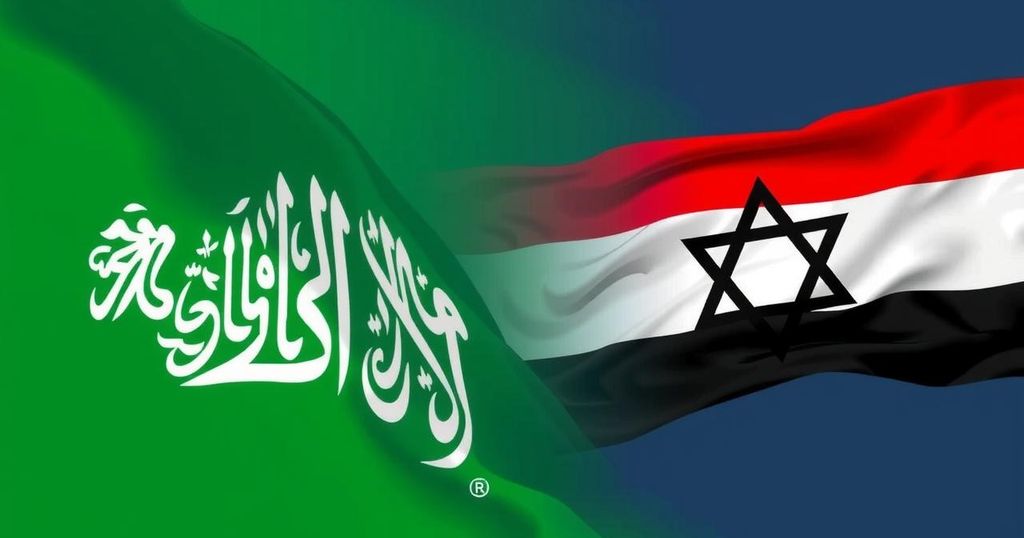A Transformative Shift: Saudi Arabia, UAE, and Egypt’s Supportive Responses to Israel’s Actions against Iran

Recent statements from Saudi Arabia, the UAE, and Egypt following Israel’s military strike on Iran hint at a strategic shift in the region. Rather than outright condemnations, these nations have issued measured responses that focus on broader regional stability and security. Their rhetoric suggests a nuanced repositioning that acknowledges Israel’s role against Iranian influence, hinting at the potential for future cooperation.
In the intricate landscape of Middle Eastern politics, the responses from Saudi Arabia, the United Arab Emirates (UAE), and Egypt regarding Israel’s recent military operations against Iran signal a notable transformation in regional alliances. Rather than the typical barrage of condemnations aimed at Israel, these nations have issued measured and carefully crafted statements—suggesting a significant shift in their diplomatic posture. The UAE’s response exemplifies this balanced caution. While the Emirati government condemned the military action against Iran, it emphasized the significance of dialogue and adherence to international law, steering the narrative towards diplomacy over confrontation. This approach aligns with the UAE’s broader diplomatic efforts, particularly following the Abraham Accords, in which they have fostered economic and security cooperation with Israel. By focusing on restraint rather than direct condemnation, the UAE implicitly acknowledges Israel’s strategic actions. Simultaneously, Saudi Arabia’s reaction reflects a similar softened tone. Although it described the Israeli attack as a “violation of sovereignty,” Riyadh’s statements prioritize the security and stability of the entire region. This change in rhetoric indicates a careful balancing act between recognizing Iran’s sovereignty while implicitly accepting Israel’s defensive measures against Iranian aggression. Such language reveals a strategic realignment, highlighting Saudi Arabia’s intent to eschew complete isolation of Israel while addressing regional threats. Egypt’s analysis further underscores this trend. Its statement echoed broader concerns regarding regional security and urged a swift ceasefire amidst escalating tensions. By framing the situation within the context of overarching regional stability, Egypt effectively redirects the focus away from Israel, instead advocating for cooperation and stability among neighboring countries. This pragmatic approach reflects Egypt’s long-standing role as a mediator in regional conflicts, particularly in light of its complex relationship with both Israel and Iran. These nuanced responses point to a potential realignment of priorities among these key Arab states. As they continue to advocate for Palestinian rights, their immediate focus appears to be the containment of Iranian influence and the promotion of regional economic stability. This evolving stance suggests an acknowledgment of Israel’s role as a counterweight against Tehran’s aspirations, which could pave the way for a more cooperative relationship moving forward. The inclination toward a “supportive condemnation” indicates that these nations may be inclined to consider Israel as a possible ally in addressing mutual security concerns, rather than solely as an adversary. In conclusion, the recent statements from Saudi Arabia, the UAE, and Egypt underscore a strategic shift within Middle Eastern diplomacy. Their restrained rhetoric reflects a departure from broader condemnation of Israel, pointing towards a future where shared concerns, particularly regarding Iran, may foster closer ties between these Arab nations and Israel. This evolution in diplomatic relations raises the prospect of a more stable regional alliance, where once disparate interests converge to address common threats.
The Middle Eastern geopolitical landscape is characterized by intricate alliances and enmities, particularly concerning Iran and Israel. The recent military actions taken by Israel against Iranian targets have elicited a response from key Arab states, namely Saudi Arabia, the UAE, and Egypt. Historically, these nations, while supportive of Palestinian causes, have expressed deep-seated opposition to Israeli military actions. However, recent shifts in rhetoric point to a possible recalibration of their relationships with Israel, particularly in light of shared security concerns regarding Iranian influence in the region. This analysis seeks to unpack the nuanced diplomatic language utilized by these states in response to Israeli actions, indicating potential trends toward a new regional alignment.
The responses from Saudi Arabia, the UAE, and Egypt to Israel’s military actions against Iran have unveiled a significant transformation in their diplomatic relations. Their measured rhetoric suggests a strategic realignment that prioritizes regional stability and security over traditional condemnation of Israeli actions. By acknowledging the threat posed by Iran and subtly accepting Israel’s role as a counterweight, these nations may be paving the way for increased collaboration, thereby altering the dynamics of Middle Eastern alliances moving forward.
Original Source: www.jpost.com








